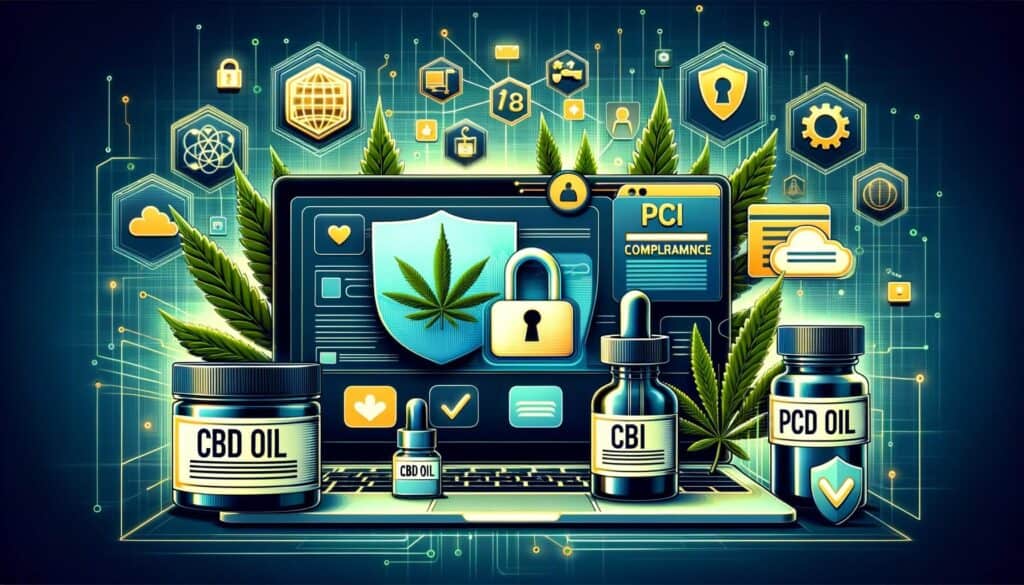
By Mia Leach February 12, 2025
In today’s digital age, e-commerce has become a booming industry, with countless businesses selling their products and services online. One such industry that has seen significant growth is the CBD oil market. CBD oil, derived from the cannabis plant, has gained popularity for its potential health benefits. As more and more consumers turn to online platforms to purchase CBD oil products, it is crucial for e-commerce stores in this industry to prioritize the security of their customers’ payment information. This is where PCI compliance comes into play.
PCI compliance, short for Payment Card Industry Data Security Standard compliance, is a set of security standards established by major credit card companies to ensure the protection of cardholder data. It applies to any business that accepts credit card payments, including CBD oil e-commerce stores. By adhering to PCI compliance requirements, these businesses can safeguard their customers’ sensitive information and maintain their trust.
Understanding the Importance of PCI Compliance

The importance of PCI compliance cannot be overstated, especially in the CBD oil e-commerce industry. With the increasing number of cyber threats and data breaches, it is crucial for businesses to take proactive measures to protect their customers’ payment information. Failure to comply with PCI standards can have severe consequences, including financial penalties, loss of customer trust, and damage to the business’s reputation.
One of the primary reasons why PCI compliance is essential for CBD oil e-commerce stores is the nature of the products they sell. CBD oil is still a controversial substance in many parts of the world, and customers may have concerns about the privacy and security of their purchases. By demonstrating PCI compliance, e-commerce stores can alleviate these concerns and build trust with their customers.
Key Requirements for PCI Compliance in CBD Oil E-Commerce

To achieve PCI compliance, CBD oil e-commerce stores must meet several key requirements. These requirements are designed to ensure the security of cardholder data throughout the payment process. Let’s take a closer look at some of the essential requirements for PCI compliance in CBD oil e-commerce:
1. Use a Secure Payment Gateway: CBD oil e-commerce stores must use a secure payment gateway that encrypts customer payment information during transmission. This ensures that sensitive data cannot be intercepted by hackers or unauthorized individuals.
2. Maintain a Secure Network: E-commerce stores must implement and maintain a secure network infrastructure to protect cardholder data. This includes using firewalls, regularly updating software, and restricting access to sensitive information.
3. Regularly Update Security Measures: It is crucial for CBD oil e-commerce stores to keep their security measures up to date. This includes installing security patches, updating antivirus software, and regularly scanning for vulnerabilities.
4. Restrict Access to Cardholder Data: Only authorized personnel should have access to cardholder data. CBD oil e-commerce stores must implement strict access controls and regularly review and update user access privileges.
5. Encrypt Cardholder Data: All cardholder data, both in transit and at rest, must be encrypted. Encryption ensures that even if data is intercepted, it cannot be deciphered without the encryption key.
Implementing Secure Payment Processing Systems

One of the most critical aspects of achieving PCI compliance for CBD oil e-commerce stores is implementing secure payment processing systems. These systems are responsible for handling customer payment information securely and transmitting it to the appropriate financial institutions. Here are some best practices for implementing secure payment processing systems:
1. Choose a PCI-Compliant Payment Gateway: When selecting a payment gateway for your CBD oil e-commerce store, ensure that it is PCI compliant. This means that the gateway has undergone rigorous security testing and meets all the necessary requirements to protect cardholder data.
2. Tokenization: Consider implementing tokenization, a process that replaces sensitive cardholder data with a unique identifier called a token. This ensures that even if the token is intercepted, it cannot be used to access the original cardholder data.
3. Point-to-Point Encryption (P2PE): P2PE is a security measure that encrypts cardholder data from the point of entry (such as a card reader) until it reaches the payment processor. Implementing P2PE can significantly reduce the risk of data breaches.
4. Secure Socket Layer (SSL) Certificates: SSL certificates encrypt data transmitted between a website and a user’s browser, ensuring that it cannot be intercepted by unauthorized individuals. CBD oil e-commerce stores should obtain and regularly update SSL certificates to protect customer data during the checkout process.
Securing Customer Data: Best Practices for CBD Oil E-Commerce Stores

In addition to implementing secure payment processing systems, CBD oil e-commerce stores must also prioritize the security of customer data. Here are some best practices for securing customer data:
1. Store Data Minimally: CBD oil e-commerce stores should only collect and store the minimum amount of customer data necessary for processing transactions. Storing unnecessary data increases the risk of a data breach and can make the business a more attractive target for hackers.
2. Implement Strong Password Policies: Enforce strong password policies for all employees who have access to customer data. This includes requiring complex passwords, regular password changes, and multi-factor authentication.
3. Regularly Update Software: Keep all software, including content management systems, plugins, and extensions, up to date. Software updates often include security patches that address known vulnerabilities.
4. Conduct Regular Security Audits: Regularly audit your CBD oil e-commerce store’s security measures to identify any potential vulnerabilities or weaknesses. This can include penetration testing, vulnerability scanning, and code reviews.
Training Employees on PCI Compliance and Data Security
Ensuring PCI compliance and data security is not solely the responsibility of the business owner or IT department. All employees who handle customer data must be trained on PCI compliance requirements and best practices for data security. Here are some key areas to focus on when training employees:
1. PCI Compliance Basics: Provide employees with a comprehensive understanding of PCI compliance, including the importance of protecting cardholder data and the consequences of non-compliance.
2. Data Handling Procedures: Train employees on how to handle customer data securely, including proper storage, transmission, and disposal methods. Emphasize the importance of not sharing sensitive information with unauthorized individuals.
3. Phishing Awareness: Educate employees about the risks of phishing attacks and how to identify and report suspicious emails or messages. Phishing attacks are a common method used by hackers to gain access to sensitive data.
4. Incident Response: Develop an incident response plan and train employees on how to respond to a data breach or security incident. This includes reporting the incident, containing the breach, and notifying affected customers.
Regularly Monitoring and Testing Security Measures
Achieving PCI compliance is not a one-time task; it requires ongoing monitoring and testing of security measures. CBD oil e-commerce stores should regularly assess their security controls to identify any vulnerabilities or weaknesses. Here are some key activities to include in your monitoring and testing process:
1. Vulnerability Scanning: Conduct regular vulnerability scans to identify any weaknesses in your network infrastructure or web applications. Address any vulnerabilities promptly to minimize the risk of a data breach.
2. Penetration Testing: Perform periodic penetration tests to simulate real-world attacks and identify any potential entry points for hackers. This can help you identify and address any weaknesses in your security measures.
3. Log Monitoring: Regularly review and analyze system logs to detect any suspicious activity or unauthorized access attempts. Implement a centralized logging system to streamline this process.
4. Employee Training and Awareness: Continuously train and educate employees on the latest security threats and best practices. Regularly test their knowledge through quizzes or simulated phishing attacks to ensure they remain vigilant.
Addressing Common FAQs about PCI Compliance for CBD Oil E-Commerce
Q1. What is PCI compliance, and why is it important for CBD oil e-commerce stores?
Answer: PCI compliance refers to adhering to a set of security standards established by major credit card companies to protect cardholder data. It is crucial for CBD oil e-commerce stores to achieve PCI compliance to ensure the security of their customers’ payment information and maintain their trust.
Q2. What are the consequences of non-compliance with PCI standards?
Answer: Non-compliance with PCI standards can result in financial penalties, loss of customer trust, and damage to the business’s reputation. In severe cases, businesses may even face legal action or be barred from accepting credit card payments.
Q3. How can CBD oil e-commerce stores implement secure payment processing systems?
Answer: CBD oil e-commerce stores can implement secure payment processing systems by choosing a PCI-compliant payment gateway, implementing tokenization and point-to-point encryption, and obtaining and regularly updating SSL certificates.
Q4. What are some best practices for securing customer data in CBD oil e-commerce stores?
Answer: CBD oil e-commerce stores can secure customer data by storing it minimally, implementing strong password policies, regularly updating software, and conducting regular security audits.
Conclusion
In conclusion, PCI compliance is of utmost importance for CBD oil e-commerce stores to protect their customers’ payment information and maintain their trust.
By understanding the key requirements for PCI compliance, implementing secure payment processing systems, securing customer data, training employees, and regularly monitoring and testing security measures, CBD oil e-commerce stores can ensure a successful and secure online business.
Prioritizing PCI compliance not only protects the business from financial and reputational damage but also demonstrates a commitment to customer privacy and security.
